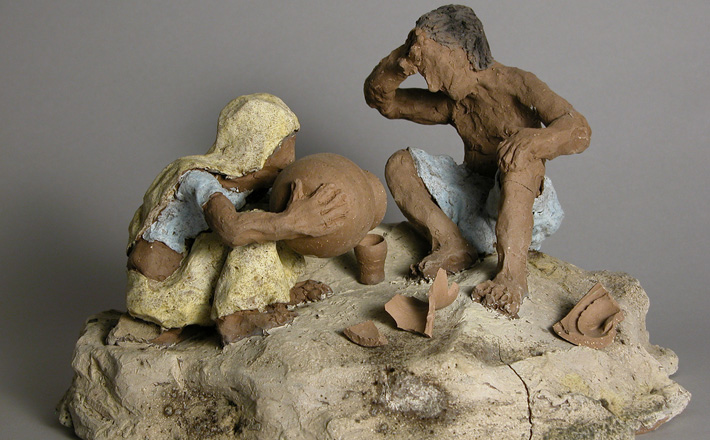Commentary on 1 Corinthians 10:1-13
In 1 Corinthians 10:1-13 Paul includes a rather bizarre retelling of Israel’s exodus to illustrate for the Corinthians their own precarious position as a church living in a wilderness time — a limbo of sorts between their newfound freedom in Christ and the waited fruition of God’s kingdom.
In this period of waiting, Paul urges the floundering church to learn from the mistakes of their “ancestors” and to be faithful to the jealous God of Israel.
The wilderness illustration comes as the second supporting proof of Paul’s larger argument regarding eating food that has been sacrificed to idols (1 Corinthians 8:1-11:1). In 8:1-13, Paul attempts to reframe the thinking of the knowledgeable ones who feel as though they have the freedom to eat idol food even in the precincts of the local temple (8:10). Paul is far less concerned about the food itself than he is about the possibility of some in the church going back to a life of idolatry. If the freedom of the knowledgeable ones leads to the destruction of the “weaker” brothers and sisters in Christ, then the knowledgeable are sinning against Christ (8:12) by asserting their liberty to eat whatever they want wherever they want.
The litmus test for sinning against Christ is not whether the “weak” are offended. Paul has no qualms about offending folks with an offensive message (1:18-25). Rather, Paul is concerned that some may turn away from the faith. The actions of the ones who know better could cause their brothers or sisters, who are less certain that there is only one God and one Lord, to resort to their former religious commitments and, thus, to abandon their life in Christ. Going back to honoring other gods and lords would lead to their destruction.
Paul urges the Corinthians to learn from two examples. In the first example (9:1-27), Paul puts himself forward as someone who, like the knowledgeable ones, holds a respected status, but unlike the “know-it-alls” at Corinth, Paul is willing to renounce his rights for the sake of everyone’s salvation, even the salvation of the weak.
The second example that Paul marshals is a negative one. Though the Corinthians are encouraged to emulate Paul, they are admonished to avoid the pitfalls of their “ancestors.” In 10:1-13, Paul likens the Corinthian church to the Israelites in their exodus from Egypt and their wilderness wanderings.
In 10:1, the apostle links the predominantly Gentile church to the people of Israel with the curious phrase “our ancestors” (literally “our fathers”). He proceeds to describe the ancient Hebrews through language strangely reminiscent of the church. Like the believers, the ancestors have undergone baptism “into Moses,” a Christ-like deliverer, and have partaken of spiritual food and drink. Furthermore, like the Corinthians, the ancestors have consumed Christ (10:4).
Why claim Christ as the spiritual Rock, the source of sustenance? The church is at no advantage over the Israelite ancestors. The same Spirit that sustained the people of God in the wilderness period is the Spirit that sustains the church. If some of the Israelite ancestors, who experienced God’s blessings, God’s deliverance, and God’s covenant, could be overcome in the wilderness by their unfaithfulness; it is also true that the Corinthian believers could rouse God’s jealousy with their participation in ceremonies at an idol’s temple (10:22). Furthermore, the “knowledgeable ones” could inadvertently lead their weaker brothers and sisters down the path of idolatry and destruction.
Paul urges the Corinthians to learn from the mistakes of the ancestors’ unfaithfulness during the wilderness wanderings. It is often noted that the behaviors explicitly described in verse 6-10 are behaviors with which the Corinthians struggle — particularly, sexual immorality (verse 8) and grumbling (verse 10). Since Paul portrays the Israelites’ religious experiences in sacramental character in verses 1-4, it is certainly likely that he continues to view the ancestors through the lens of the church’s experience in verses 6-10.
Though it is impossible to determine with certainty the biblical references to the wilderness allusions in verses 6-10, there are possible referents to each of these behaviors in Israel’s scriptures. While space does not allow a thorough examination of these possibilities, it is interesting to note that in each case — whether the Israelites are grumbling or inter-marrying — the charges against Israel are typically framed as a failure to be faithful to God (see for example Numbers 21:4-9; 25:1-9; Psalm 78 and 106). Perhaps, this is why Paul views the dilemma of eating idol food as not only sinning against the community but as sinning against Christ (1 Corinthians 8:12).
Paul hopes that the church will learn from scripture (verses 6 and 11). What does scripture teach? In 1 Corinthians 10:1-13, Paul’s retelling contrasts the unfaithfulness of the ancestors with the faithfulness of God. The Corinthians can learn from scripture that they have been called by a jealous God, who demands and enables faithfulness in return (10:14-22). They should avoid idolatry and should avoid causing others in the community to go back to their former idolatrous lives.
In 10:12, Paul’s address to “anyone who thinks he stands” calls to mind the knowledgeable ones who have all the “right theology” to support their sin against the church and their sin against Christ (8:1-6).
Paul realizes that the temptation to eat idol food at the local temple is more than a food matter. It is not that the knowledgeable ones are reluctant to give up steak. Rather, the knowledgeable folks risk their social standing every time they refuse an invitation to dine with their social peers or superiors. The temptation is to sacrifice a weaker member of the community — likely a community member who is beneath them in social standing — for the sake of their own social welfare.
Dining in local temples has a two-pronged effect on this community. The knowledgeable who “think that they can withstand the temptation” are only tempting others back to a life of idolatry and are, themselves, flirting with idolatry, if not by honoring the actual god or goddess of the temple, then by placing their social status before following the example of Christ.
At the end of this larger argument on whether or not it is acceptable to eat food that has been sacrificed to idols, Paul will give a guiding principal: “do all to the glory of God” (10:32). Like their ancestors in the faith, this predominantly Gentile Corinthian church is called to live in a manner that is faithful to the one who is the very source of their life and existence. Living faithfully to this God includes considering one’s witness to others for whom Christ also died.


March 3, 2013